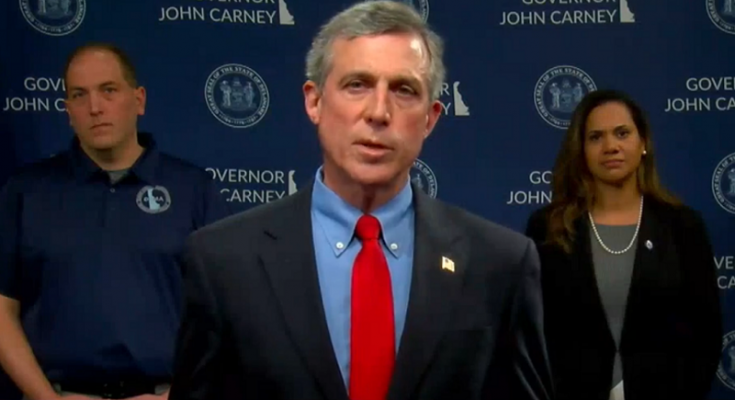AUGGovernor John Carney today renewed his State of Emergency declaration for the fifth time since it was first initiated on March 12 to fight the spread of COVID-19.
Under Delaware law, State of Emergency declarations must be renewed every 30 days.
The renewal was expected. Without the State of Emergency in effect, none of the governor’s restrictions on business operations, public gatherings, and other virus-related directives would be enforceable. Thus far, the governor has modified his State of Emergency declaration 24 times.
“We are beating COVID-19, but we can’t let up,” Gov. Carney said. “This virus is still out there, and it can cause serious illness. We know from public health experts that following basic health precautions is the best way to prevent community spread. Wearing a face mask in public settings is still required by this State of Emergency declaration.”
The Delaware Code (Title 20, Chapter 31) gives the governor the power to declare a State of Emergency in response to any current or anticipated emergency or disaster posing a threat to the public.
The initial State of Emergency declaration can last for up to 30 days, after which it can be renewed by the governor at his or her discretion, without public consent or the participation of their elected officials in the General Assembly.
State Rep. Rich Collins (R-Millsboro) introduced legislation earlier this year that sought to provide a check to the unlimited authority. House Bill 330 would have preserved the governor’s ability to initially declare a State of Emergency, allowing him or her to respond rapidly to any situation potentially placing Delawareans in peril. However, the proposed reform would have required the General Assembly’s approval for any renewal.
The bill died in the House Administration Committee after the House of Representatives’ three Democratic leaders, who constitute the majority of the five-member panel, chose not to release it.
Rep. Collins says he questions the need for renewing the State of Emergency, citing the latest COVID-19 data:
Hospitalizations related to the coronavirus have fallen to 47 — less than 14% of the high water mark of 337 set on April 27.
The percentage of people testing positive for the virus has averaged below 5% (the threshold recommended by the World Health Organization) for nearly three weeks.
Less than 4% of the state’s COVID-19-related fatalities have taken place during the last month (July 4 – August 4).
“According to preliminary data from the Delaware Office of Vital Statistics, the death rate has fallen to normal and is less than what we experienced at this time in 2018,” Rep. Collins said. “It is shocking that after Delaware’s death rate falls to normal levels that we are only in Phase II of our recovery plan with Phase III nowhere in sight. What are they waiting for, Election Day?”
Governor Carney moved the state economic recovery plan to Phase II on June 15, but ten days later announced that Phase III would be delayed indefinitely. The governor has not formally disclosed what statistical benchmarks need to be achieved before the economic recovery plan can move forward or when that may occur.
Source: Delaware State House of Representatives, House Republican Caucus,

